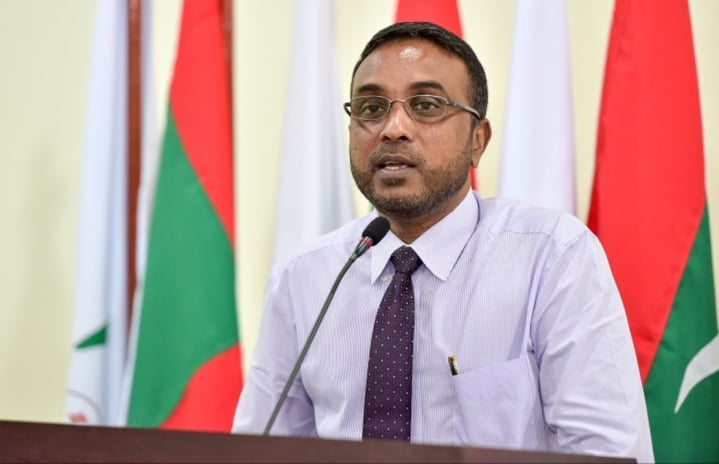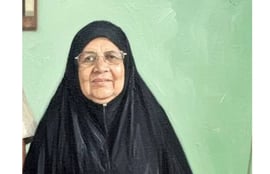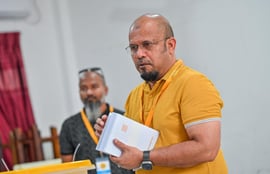Ex-ACC head claims coerced testimony to Criminal Court
Former President of Anti-Corruption Commission (ACC) Hassan Luthfee on Monday submitted a letter to Criminal Court claiming that the state coerced him to provide testimony in the case against former Legal Affairs Minister at the President's Office, Aishath Azima Shakoor.
Former President of Anti-Corruption Commission Hassan Luthfee. He submitted a letter to Criminal Court claiming that he was intimidated and enforced by the state to testify in the court case against former Legal Affairs Minister at the President's Office Aishath Azima Shakoor. PHOTO: MIHAARU.
Raif Amyl Jalyl
2019-09-03 10:35:03
Former President of Anti-Corruption Commission (ACC) Hassan Luthfee on Monday submitted a letter to Criminal Court claiming that the state coerced him to provide testimony in the case against former Legal Affairs Minister at the President's Office, Aishath Azima Shakoor.
The ongoing case against Azima are on the charges of enabling money laundering and disseminating false information to a government institute.
She is accused of being an accessory in former President Abdulla Yameen Abdul Gayoom refusing to hand over the MVR 1 million deposited in his Maldives Islamic Bank account by SOF private limited, and circulating the sum within his accounts and deriving profit from the transactions instead.
Yameen previously claimed that he had deposited the funds into an escrow account jointly owned by himself and the ACC, thereby placing the embezzled money under the care of the graft watchdog.
Azima had sent documents to ACC, during her tenure, claiming that the sum was deposited to the escrow account in compliance with ACC's orders. However, it was later revealed that Azima deceived the watchdog with false documents.
Criminal Court's Chief Judge Ahmed Hailam, tasked with presiding over the case, revealed on Monday's hearing that a letter from Luthfee was received claiming that he was intimidated and forced by the state into providing his testimony. Judge Hailam further relayed that, according to Luthfee, he would not be able to provide his testimony as there is no environment that permits honest testimony.
The state affirmed that it oversaw the video footage of Luthfee's statements taken in the interview related to the investigation conducted by Maldives Police Service into the case.
Claiming that there is no evidence of coercion in the interview footage, the state requested that the video footage be reviewed before making a decision regarding whether Luthfee can be considered as a witness.
While the state did not submit any evidence in the hearing that was previously held, Azima presented certain documents to the court.
Azima's documents declared that the testimonies of Yameen, incumbent President of ACC Muaviz Rasheed, Deputy CEO of Bank of Maldives Mohamed Shareef, in addition to Luthfee's statements, cannot be considered in the case.
According to Azima's documents, Luthfee cannot testify due to the ongoing Police investigation against him, as well as over his claim that he was intimidated and coerced into providing his testimony. Azima presented that he would not be able to testify of his own volition.
She discredited Yameen's eligibility to testify by quoting the Supreme Court's verdict barring defendants prosecuted under the same charges from testifying for or against each other. She made the case that the lower court must comply with the apex court's orders.
According to the documents, BML's Deputy CEO Shareef can not be considered as a witness due to the ongoing Police investigation against him on charges of disseminating false information to a parliamentary committee. Further, as Muaviz would not be able to testify freely in this case, she presented that his testimony should not be considered.
Moreover, Azima submitted a request to postpone proceeding with the case against her until the money laundering charge against Yameen is substantiated. A Supreme Court verdict was previously issued that an accessory to a crime would not be prosecuted until a verdict is issued on the perpetrator.
- The charges against Luthfee do not discredit his eligibility to testify as a witness in court as the parties behind his investigation declared that there is no reason he would not be able to give testimony. Further, attaining testimony from witnesses under investigation was previously practised as well.
- Defendants facing the same charges are able to testify for or against each other as per the practice in Maldives, and in such cases, the verdict would not be passed based alone on the testimony. The state further revealed that Azima is not being charged over Yameen's statement's alone but by multiple witness testimonies. The state declared there are no reasons to discredit his eligibility.
- The charges against Shareef do not provide a reason to negate his testimony.
- There are no reasons against Muaviz testifying.
- If the case against Azima were to be postponed until the charges against Yameen are substantiated, further problems may arise. The penal code dictates that a criminal case in court must be completed within a set timeframe, and any delays might violate this mandate.
Chief Judge Hailam poised questions to the state in the hearing, including queries regarding why the state claimed that Azima imposed undue influence, and whether giving advice to open escrow accounts was a crime.
The state responded that Luthfee's statements revealed that Yameen's bank statements were provided to ACC from the President's Office, in compliance with the graft watchdog's efforts to acquire the bank statements.
Further, the state affirmed that while advice to open escrow accounts are not inherently illegal, it iterated that investigating into the conduct in this case revealed many aspects of money laundering.
Azima responded that while the bank statements were provided from the President's Office, there are many employees that work at the office. She further denied giving any advice to open an escrow account, and stated that she only complied with Yameen's directions to communicate with ACC.
She declared that she would not have complied with any illegal directions, had Yameen given any.
Monday's hearing concluded with the court opting to make decisions regarding Azima's presented arguments in further upcoming hearings.
Copyright © 2026 The Edition
- Terms of Use
- Privacy Policy
- Code of Ethics
- Editorial Policy
- Contact
Copyright © 2026 The Edition
mihaaru.com




